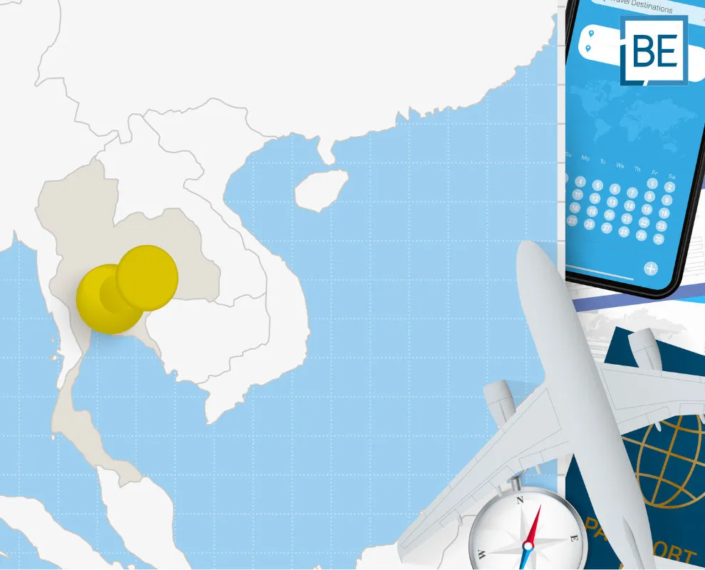Belaws Home ›› Thailand ›› Blog ›› Airbnb and the Tourism Authority of Thailand work together to promote remote work in Thailand
News > Remote work in Thailand, Long-term Visa
Work remotely in Thailand
With the Thailand long term Visa
13/07/2022
Airbnb and the Tourism Authority of Thailand
work together to promote remote work in Thailand
Airbnb recently announced a new initiative called “Live and Work Anywhere“. This initiative is aimed at helping employees to work remotely. As part of the program, Airbnb announced 20 destinations that will be promoted as part of the scheme. Each of these destinations will be given a special page on its website, known as ‘hubs of remote work’.
Out of these 20 destinations, Thailand was also included in the list. It was also announced that Airbnb will partner with the Tourism Authority of Thailand (TAT) to create a “Thailand Hub” page. This page will highlight the long-term accommodation options, entry requirements for Thailand, and visa (Long-term Visa) types available.
Key points
- Thailand has been included in Airbnbs ‘Live and work anywhere’ program.
- Thailand will be provided with a special page on Airbnb’s website, featuring information about life as a digital nomad in Thailand.
- Thailand’s Long-Term resident Visa (LTR) will be available from September 2022.
What will the partnership between Airbnb and the TAT involve?
As part of the partnership between Airbnb and the TAT, both parties will work closely with each other on a range of initiatives.
Such initiatives include:
- The creation of a dedicated hub for Thailand that will promote the top local long-term stay listings, as well as important information relating to the current entry requirements and visa policies.
- Airbnb will also partner with Thailand to create educational campaigns aimed at promoting responsible hosting and travelling as a remote worker.
The Thailand hub is expected to launch later this year.
Why work remotly in Thailand?
Thailand has long been an attractive option for a wide range of people, including those who wish to work remotely and entrepreneurs. Thailand’s attractiveness stems from its well established infrastructure, low cost of living, and top destinations to visit.
Thailand and more specifically Bangkok was ranked as the second-best city for digital nomads to work by Instant Group. Furthermore, the William Russell website named Koh Phangan the global top spot for workcations.
Other destinations including Koh Samui, Chiang Mai and Phuket have long been popular destinations for digital nomads as well.
Is it legal to work remotely in Thailand?
Until recently Thailand did not have a visa which allowed remote workers to stay in the country long-term, and legally work. Most digital nomads lived and worked in Thailand through the use of tourist or education visas. It is important to note, the use of such visas are a grey area as they do not allow holders to undertake employment.
However, the Thai cabinet recently approved a new visa, known as the long-term resident visa scheme (LTR). The LTR is due to come into full effect from Sept 1, 2022. The LTR will allow remote workers and wealthy pensioners to live and work in Thailand for 10 years. The LTR also comes with a series of other unique benefits, not available to other types of visa.
Do you need a work permit to work remotely in Thailand?
Yes, In order to be able to work remotely in Thailand your must qualify for Long Term visa and, remote workers must be able to prove that they have earned a salary of at least US$80,000 (2.8 million baht) over the past two years.
Furthermore, under the Long term visa criteria, Digital nomads could also qualify as either “Working Foreigners” or “Specialists”. In order to be considered as a “Working Foreigner” or “Specialist”, the applicant must satisfy the following 2 requirements:
1) They must have an employment or service contract with a Thai OR a foreign company.
2) They must be able to provide proof of 5 years work experience in the relevant industry, completed within 10 years of the application date.
For more information about the LTR, please take a look at our blog post here.
How can our experts help?
Our team of immigration experts are on hand to help you make your Visa applications as smooth as possible. If you are in need of assistance with regards to staying in Thailand or working in Thailand, you can browse our Visa services here.
Belaws understands that the visas in Thailand can often be confusing, this is why our visa expert is available to help you identify and apply for the best visa for your situation. In order to provide the most accurate and reliable advice for your needs, Thai Visa Belaws offers a visa consultation with our visa expert.
During this consultation our visa expert will assess your current situation and needs and provide a solution for the most suitable visa or extension. Our visa expert has helped numerous clients and has a vast amount of experience and can help you come to a desirable outcome.
Please note that this article is for information purposes only and does not constitute legal advice.
Our consultations last for a period of up to 1 hour and are conducted by expert Lawyers who are fluent in English, French and Thai.
Consultations can be hosted via WhatsApp or Video Conferencing software for your convenience. A consultation with one of our legal experts is undoubtedly the best way to get all the information you need and answer any questions you may have about your new business or project.
USD 150
Up to 1 hour
Online payment (Paypal or Credit card)
Legal consultation can be conducted in English, French or Thai
Legal consultations are handled by experienced lawyers from the relevant fields of practice
Frequently asked questions
about remote work in Thailand
How do I get a long term residence visa for Thailand?
This visa will be available from September 2022. Applicant must also satisfy the application criteria as well.
How long can foreigners live in Thailand?
This depends on what visa person in question holds. Those who are employed by a Thai company, married to a Thai national or retired can get yearly visa extensions. Education visas and the Thailand Elite also offer long-term stays for the holders. Permanent residency and Thai citizenship is also available for qualifying people.
Can I live in Thailand permanently?
Those who qualify for Non-Immigrant O visas can extend their stays yearly, as long as they satisfy the application requirements. The Thailand Elite program also offers long term stays, which can be extended. Permanent Residency and Thai Citizenship can also be obtained (should the application requirements be met).
Can you get permanent residency in Thailand?
Thailand does offer Permanent Residence for those who satisfy the application criteria.
Can foreigners retire in Thailand?
Yes, Thailand offers a Non-immigrant O visa for retirees. There are however, application requirements that must be satisfied before applying. Examples include, monthly/yearly financial and insurance requirements.
Can I stay in Thailand for 12 months?
Thailand has various different visa options for those who wish to stay for a year (subject to qualification requirements). Examples include, the Thailand Elite visa, education visa, retirement visa etc.
Does Thailand have digital nomad visa?
Until recently Thailand did not have a visa which allowed remote workers to stay in the country long-term, and legally work. Most digital nomads lived and worked in Thailand through the use of tourist or education visas. It is important to note, the use of such visas are a grey area as they do not allow holders to undertake employment.
Can i work remotely in Thailand?
Yes and No, Until recently Thailand did not have a visa which allowed remote workers to stay in the country long-term, and legally work. Most digital nomads lived and worked in Thailand through the use of tourist or education visas. It is important to note, the use of such visas are a grey area as they do not allow holders to undertake employment.
Related posts
Subscribe today
Subscribe today
To our newsletter for all the latest legal news
in South East Asia, Belaws updates and
special promotions on our services.
To our newsletter today for all the latest legal news in South East Asia,
Belaws updates and special promotions on our services.







